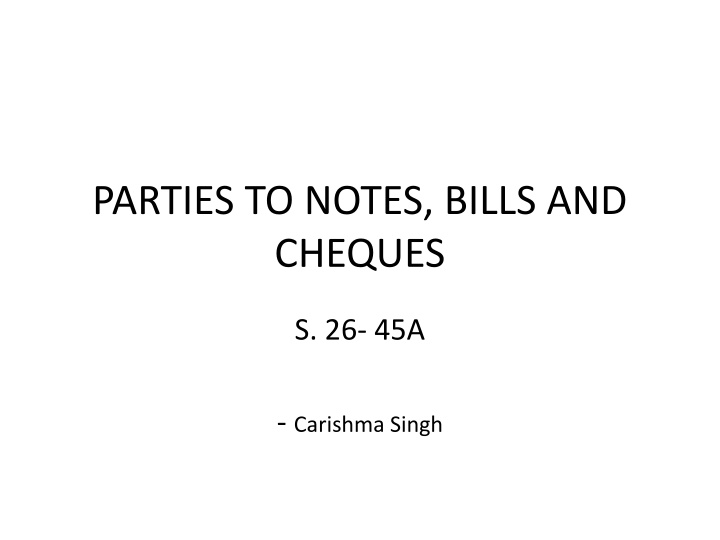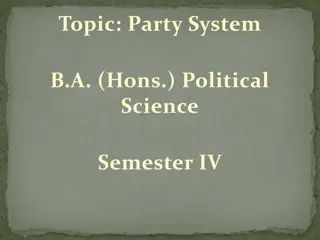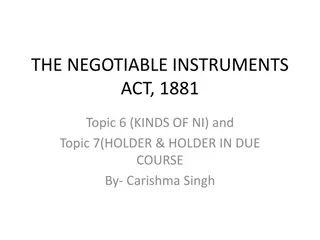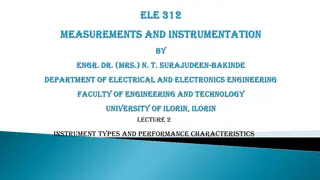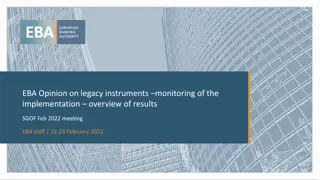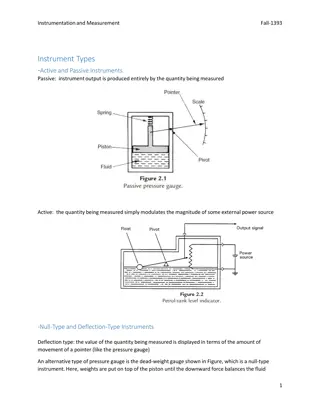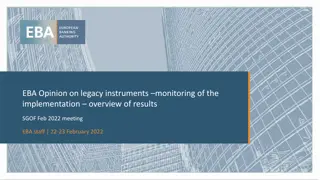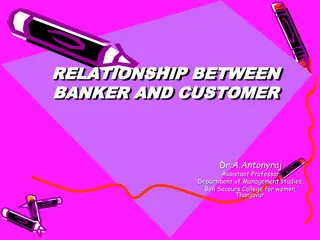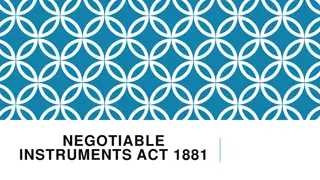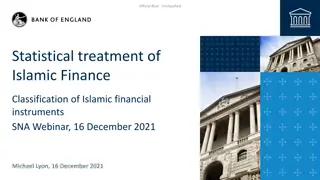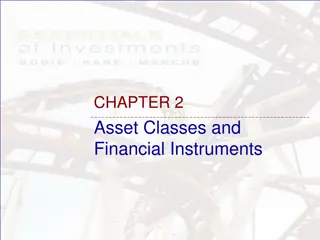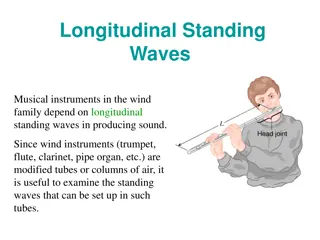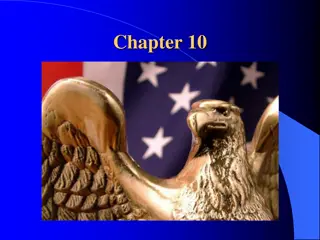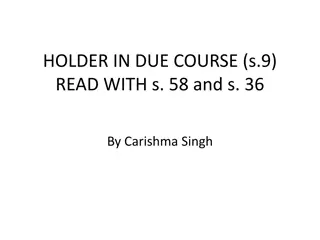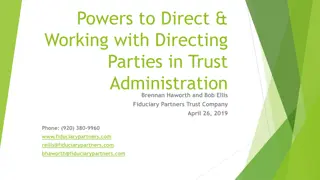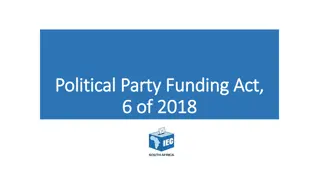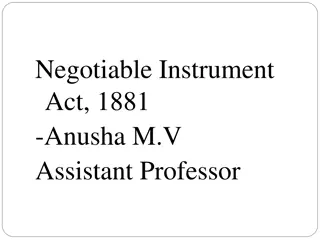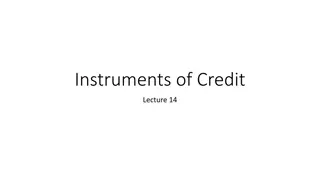Capacity of Parties in Negotiable Instruments
This content discusses the capacity of parties involved in negotiable instruments, covering aspects such as minors' ability to draw instruments, contractual capacity of corporations, legal implications of dealing with parties of unsound mind, and the role of agency in binding principals. It emphasizes the importance of understanding the legal capacity of parties when making, accepting, endorsing, drawing, or negotiating negotiable instruments.
Uploaded on Feb 28, 2025 | 0 Views
Download Presentation

Please find below an Image/Link to download the presentation.
The content on the website is provided AS IS for your information and personal use only. It may not be sold, licensed, or shared on other websites without obtaining consent from the author.If you encounter any issues during the download, it is possible that the publisher has removed the file from their server.
You are allowed to download the files provided on this website for personal or commercial use, subject to the condition that they are used lawfully. All files are the property of their respective owners.
The content on the website is provided AS IS for your information and personal use only. It may not be sold, licensed, or shared on other websites without obtaining consent from the author.
E N D
Presentation Transcript
PARTIES TO NOTES, BILLS AND CHEQUES S. 26- 45A - Carishma Singh
CAPACITY OF PARTIES LIABILITY OF PARTIES
CAPACITY OF PARTIES S.26 (CAPACITY TO MAKE) Any person can make, draw, accept, indorse, deliver and negotiate a NI if he is capable of contracting under Law. Minors- can draw, indorse, deliver and negotiate (but not accept) a NI. This binds all others but not the minor himself. The instrument does NOT become void by the minor being a party Corporation- Unless so empowered, it cannot make, indorse or accept such instruments. The contractual capacity depends on its memorandum of association or charter of incorporation.
Examples A minor, Amit makes a Pro note in favor of Atul. Atul did not know that Amit is a minor. Amit makes a part payment but fails to pay the entire amount. Atul s suit for recovery can not be sustained as Amit is a minor who can draw a NI but the NI does not bind him. On the other hand if Amit, the minor was the payee and not the maker, the payment can be enforced by him or on his behalf
A person of unsound mind, Manish makes a promissory note in favor of Abhay. When Abhay does not receive payment upon maturity, he sues Manish. His claim can not sustain as Manish is legally incapable of contracting and hence can t make or draw a Pro. Note. One must therefore be sure of the legal capacity of the other party while making, accepting, indorsing, drawing, negotiating a NI.
CAPACITY OF PARTIES s. 27 (AGENCY) Every person Capable of binding himself (acc to s. 26) Or of being bound (acc to s. 26) May do so : by a duly authorized agent acting in his name The general rule that a principal is bound by the acts of his agent will apply to negotiable instruments as well.
The is a general authority to transact business and receive and discharge debts does not confer upon him The power of accepting bills Or indorsing bills so as to bind the principal An authority to draw bills of exchange does not of itself import an authority to indorse.
LIABILITY OF PARTIES s. 28 (LIABILITY OF AGENT SIGNING) An agent who signs his name to a promissory note, bill of exchange or cheque without indicating thereon that he signs as agent, or that he does not intend thereby to incur personal responsibility, is liable personally on the instrument, except to those who induced him to sign upon the belief that the principal only would be held liable.
Ordinarily the person signing is liable, unless he specifies otherwise The section is silent about what words to use- any words that communicate his representative capacity may be sufficient Things like for , agent for , on behalf of , without recourse to me , [principal s name] through their agents etc may be written on the instrument near the agent s signature.
Tirumala reddi Ramagopala Reddy v. Bhimavarapu Paravathi AIR 1940 Mad 874 Suit by respondent on appellant for repayment of money due on a pro note Preamble of the pro note named the sons of Late. T Chinna Archireddy and his wife Some of the sons signed the note, while some did not(Sivaramakrishna Reddy did not) The minor son, Satyanarayana Reddy, was supposed to be signed for by the mother- but she did not state so on the face of the NI and was therefore signing in her individual capacity.
Upon the question of enforceability of the pro note- the court held that in cases where multiple parties are named but some do not sign, the issue is to ascertain whether they intended to be bound irrespective of others mentioned on the note ? Since such intention (to not be bound) could NOT be established, they were said to be bound. The mother was bound in her individual capacity due to the operation of s.28 of the Act
Judgment I find no force in the contention of the learned Counsel for the appellants that since the third appellant intended to execute Ex.A.1 on behalf of his minor son but not in her individual capacity, it cannot be enforced against the 3rd appellant. The principle laid down in Section 28 of the Negotiable Instruments Act would apply to execution of the instrument by the guardian of a minor. If the third appellant intended to execute Ex.A1 for and on behalf of her minor son, she ought to have mentioned that she is signing the promissory note on behalf of her minor son. When she omitted to mention that she is executing Ex.A1 on behalf of her minor son, and signed it as if she is executing it for herself, she is bound by Ex.A1 and so the Courts below granting a decree against the third appellant cannot be said to be erroneous .
LIABILITY OF PARTIES s. 29 (LIABILITY OF LEGAL REP. SIGNING) A legal representative of a deceased person who signs his name to a promissory note, bill of exchange or cheque is liable personally thereon unless he expressly limits his liability to the extent of the assets received by him as such. Express words to limit liability to the extent of the assets received are needed and not just description of being a signatory, legal representative, administrator of estate etc.
